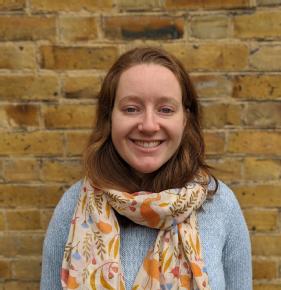Warwick astronomer among first UKRI Stephen Hawking Fellows
- Dr Rebecca Nealon to join University of Warwick in researching protoplanetary discs – the birthplaces of planets
- One of the first to receive a Stephen Hawking Fellowship
- Fellowships are in recognition of Stephen Hawking’s exceptional contributions to scientific knowledge and popularisation of science
 A University of Warwick researcher will be one of the first nine Stephen Hawking Fellows, announced today, who will continue Professor Stephen Hawking’s legacy by furthering our understanding of the universe and communicating the wonders of science to the public.
A University of Warwick researcher will be one of the first nine Stephen Hawking Fellows, announced today, who will continue Professor Stephen Hawking’s legacy by furthering our understanding of the universe and communicating the wonders of science to the public.
They will tackle major scientific questions such as the nature of the early universe and dark matter and whether string theory really is a ‘theory of everything’, engaging with the public through stand-up comedy, art and music.
The Stephen Hawking Fellowships were launched by UK Research and Innovation (UKRI), working with the Hawking family, in recognition of Stephen Hawking’s exceptional contributions to scientific knowledge and popularisation of science.
UKRI will support up to 50 postdoctoral scientists through the Stephen Hawking Fellowships scheme, with further calls to be launched in due course.
Dr Rebecca Nealon (pictured) will join the University of Warwick Department of Physics to research protoplanetary discs. As the planets in our solar system are all aligned so their orbits are in one plane, we might imagine that discs where planets are formed around other stars are also aligned. However, recent observations have shown that there are a number of systems where this is not the case. Dr Nealon’s research will focus on how these discs are created and evolve as well as their potential impact on planet formation, leading to a more comprehensive picture of disc and planet formation.
Dr Rebecca Nealon said: “I am delighted to be awarded a Stephen Hawking Fellowship. This research is so timely given that observations are continuously finding evidence of misalignments, and I'm very pleased to be given the opportunity to pursue these. I'm also thrilled to be joining the world-leading research group at the University of Warwick and to contribute to their research and excellent outreach programs.”
Professor David Leadley, Head of the Department of Physics at the University of Warwick, said: “The study of exoplanets, their formation, dynamics and atmospheres, is a major focus of research for Warwick Physics and we are extremely pleased that Rebecca Nealon will be joining us as a Stephen Hawking Fellow. As we now know planetary systems around other stars can be very unlike our own solar system, Rebecca’s simulations have a huge role to play in expanding our understanding of what might be possible elsewhere. Rebecca is also a great communicator who will exploit the focus on public engagement within the Stephen Hawking Fellowship, which we especially welcome, to promote science.”
Professor Stephen Hawking’s children, Lucy, Robert and Tim Hawking, said: “We are proud to be associated with this initiative, which builds on the legacy of our father by supporting research into these areas of science.
“One of his greatest achievements was opening up even the most complex scientific breakthroughs to the wider world and we hope that these Fellows are able to continue that important mission by inspiring people from all walks of life in the wonders of science.”
UK Research and Innovation Chief Executive, Professor Sir Mark Walport, said: “Professor Stephen Hawking pushed forward the boundaries of human knowledge, both through his research which transformed our understanding of the universe and his rare talent for communication.
“The Fellows announced today will continue his legacy, pushing the boundaries of knowledge and inspiring the public with the value and beauty of science.”
Each fellowship provides up to four years’ funding, dependent on the nature of the proposed research, for fellows with a strong passion for curiosity-driven science, who seek to challenge current assumptions and inspire the public through their work.
Fellows will be supported with training in public engagement and scientific communication to help them inspire a wider audience to explore complex scientific ideas, continuing Professor Hawking’s legacy of bringing science into popular culture.
The Stephen Hawking Fellowships are delivered by UKRI’s Engineering and Physical Sciences Research Council and Science and Technology Facilities Council.
Dr Rebecca Nealon – University of Warwick
Protoplanetary discs are formed by the gravitational collapse of gas and dust and serve as the birthplace of planets. Recent observations have shown that not all of these discs are aligned like the planets in our solar system. Instead, some are misaligned and show complicated structures.
Dr Nealon's research will focus on the formation of these misaligned discs and could generate new knowledge about how planets interact with their host disc as well as the diversity of planets outside of our own solar system.
She will use numerical simulations along with observations of protoplanetary discs, generated through state-of-the-art telescope facilities, to engage the public as well as delivering public talks and contributing to outreach activities.
Ends
Notes to Editors:
UK Research and Innovation works in partnership with universities, research organisations, businesses, charities, and government to create the best possible environment for research and innovation to flourish. We aim to maximise the contribution of each of our component parts, working individually and collectively. We work with our many partners to benefit everyone through knowledge, talent and ideas.
Operating across the whole of the UK with a combined budget of more than £7 billion, UK Research and Innovation brings together the seven research councils, Innovate UK and Research England.
6 March 2020
For interviews contact:
Peter Thorley
Media Relations Manager (Warwick Medical School and Department of Physics)
Email: peter.thorley@warwick.ac.uk
Tel: +44 (0)24 761 50868
Mob: +44 (0) 7824 540863
